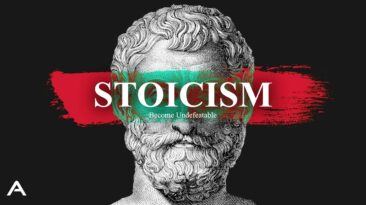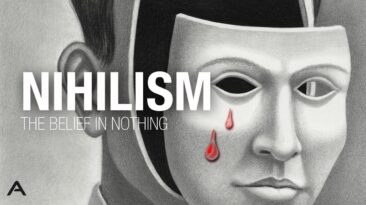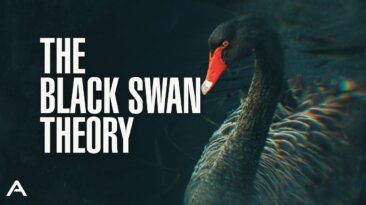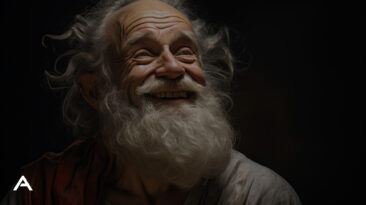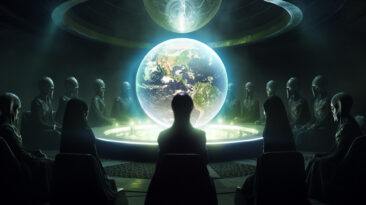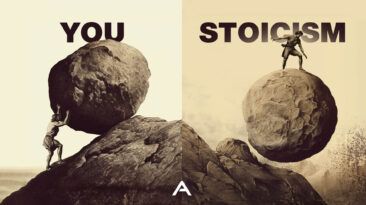When I started this YouTube channel, I became fixated on the day it would succeed. I stopped going out with friends and spent every waking moment working toward, and dreaming about the future.
When I did manage to go out with friends, I spent all my time daydreaming. I was stuck imagining a far-off future. A future that would never come.
Don’t get me wrong, objectively, this channel is successful, and all of you who choose to watch these videos have completely changed my life. But the future I dreamed of will never come because there’s always something more to chase. Something bigger and better to look forward to.
Many of us live life like this. We spend most of our time preoccupied with things that don’t exist and very little time enjoying the things that do.
When we’re not fixating on the future, we’re being haunted by our past. We spend our nights curled up in bed, thinking about the wrong choices we’ve made in the past and what we wish we’d done instead.
As a culture, we’re obsessed with time. We’re both haunted by the past and dreading the future. But the truth is that the future and the past don’t exist.
We might think that the past and the future are as real as the present, but that’s the illusion of time. In reality, the present is the only thing that exists.
A clock tracks movement, like the rotation of Earth and our orbit around the Sun. But its measurement of time isn’t objective. There is only the present, and its direction is forward.
The past can be accessed by our memories or recordings. But even this access is tremendously limited. Our memory is fallible. We often misremember critical details of events and can be influenced to think we did something we never did. Memory itself is known to get less accurate each time we think to reflect on it.
And when video is available, it doesn’t give you the first-person experience. It’s only a tiny piece of the past that doesn’t truly capture what it was like to be there or the full range of emotions you felt at the time.
The past is just a previous experience of the present. It doesn’t exist.
The future hasn’t happened yet. We might prepare for conditions like rain later in the week. Many of us will make plans for a satisfying career. But these things don’t exist, and there’s a fair chance they won’t ever exist. The forecast is often wrong, and careers rarely go as planned.
If you continue to obsess over the past and the future, you’ll never truly live a full life. You’ll be too busy thinking about moments that have either already passed or are yet to come. You’ll forget to be in the present and to take it all in.
Whereas animals live primarily in the present, humans have strong memories. We can bind time together. This can be helpful from a survival standpoint. Our species anticipates the future and prepares for it now. This was necessary for humans to successfully survive threats and to develop more complex societies.
Early humans carved spears to take down woolly mammoths. They realized that if they made these weapons now, they’d have a better chance of killing a giant beast tomorrow. They also anticipated that a mammoth would provide sustenance for a long time. By preparing for the future, they significantly increased their odds of survival.
This ability to plan for the future is why we’re here today. But we’ve paid a heavy price for our practical sense of time. And that price is our happiness. Our peace of mind. We’re too stuck in the future to be at ease now.
We make it all seem OK by telling ourselves the big lie. According to the British philosopher, Alan Watts, this notorious untruth is that we think we’ll be happy in our imagined future. But it never comes. When that future does arrive, according to our current definition of time, we’ll be stuck in another imagined future.
Our minds will be focused on the future until our bodies no longer have a pulse.
It’s like a donkey chasing a carrot on a string. We can never get closer to our meal, and our appetite will never go away. To an observer, the donkey is foolish. But from a first-person perspective, we’re convinced of the illusion. We don’t see the string or the stick, only the carrot and the promise that it holds.
Our memories control our lives. We make decisions about the present and the future based on what happened in the past.
Using our memory, we limit the possibilities of the present. We assume we can’t do something because we weren’t able to do it in the past. We avoid going places and doing things because we’ve previously had poor experiences with them.
Sometimes, we decline offers because they conflict with our sense of who we are – based on our past understanding of our identity. You may think of yourself as self-sufficient, but what about those moments when you truly need help? People have died clinging to their identity as self-sufficient, and why? Because they’re tied to a past that doesn’t even exist.
Our schools train us to always look for the next ladder to climb. The present is mostly considered beneath us. We criticize those who live ‘in the moment’ because they’re not preparing for the future. They’re focused on now, which, by our cultural standards, is often regarded as anti-social behavior.
We invent gadgets for productivity thinking they will give us more time. It’s like saying you can enjoy more moments if you buy the next piece of tech. But all we end up doing is anticipating the next upgrade or the next big innovation. That’s why the most popular question that tech reviewers get is, “Should I buy this now, or wait for the next one?”
And when we get new technology, we use it to escape the now rather than embrace it. For over fifteen years, we’ve had the ultimate tool for fleeing the present: our smartphones.
We turn to our phones whenever we’re idle or in any situation without something purposeful to do. We feel a panic from the present and escape it by seeking out the past and future on our mobile.
We make plans with text conversations or by opening up the calendar app. We browse news about what’s already happened or read about predictions for what will happen next. Alerts are set in the reminders app, and we accept notifications to warn us about anything and everything that isn’t our present moment.
When’s the next ball game? What are the best beach resorts? Where’s the price of housing headed? We’re constantly searching for answers about the future instead of enjoying the present.
On social media, we look at images of the lives of others. We project ourselves into a future where we’re on vacation like our social media connections. Or, we look back on the trips we’ve taken in the past, and with regret, we wish we had planned things differently.
It’s not so easy to live in the present. Sitting still gives us anxiety as a survival mechanism. Preparing for the future, and anxiety, are intrinsically connected. We’re not planning for the future when we’re in the moment. It can feel a bit like closing your eyes when you’re driving. You’re not looking at what’s ahead to avoid disaster.
But we’ve evolved beyond the point where survival always needs to occupy our minds. In fact, many of our jobs are only connected to survival because they provide us with an income to buy food and shelter. We’ve got free time outside of our occupations.
At the very least we should enjoy our free time by living in it. Our smartphones opened a gateway to filling that time with plans for the future. Many of us will prepare for our next workday or respond to emails about the past. We ignore the people around us and become more distant from them.
Relationships are all about the present. One of the ways you can tell they’re not going so well is if one or both partners aren’t very present.
The more we try to escape the present moment, the more we neglect our relationships. Ironically, many of our plans are intended to strengthen our relationships. We save for retirement and vacations. In other words, we’re planning for a time when we can exist in the moment. But when that time comes, we’ll be stuck thinking about another future instead of enjoying it.
Of course, global issues make living in the moment particularly challenging. The climate is changing due to humans creating greenhouse gas emissions – a legitimate threat to our survival. We need to do what we can to prevent catastrophes in the future. But we shouldn’t let that steal the present from us. Otherwise, we’ll only be saving a future that we won’t even be bothered to live in.
Alan Watts was a student of Eastern philosophy. He studied Buddhism, Zen Buddhism, Daoism, Hinduism and more. And from his studies, he took away the importance of being present and methods of living in the now.
Distilling these religious concepts made him very popular in the West. He wasn’t a proper scholar in the strict sense, but he wrote a lot of books on these subjects and gave a lot of entertaining lectures. Some of his teachings are a bit dated now, but his distilled messages are still relevant as the future continues to haunt us at every turn.
Watts had a particular interest in Zen Buddhism. It’s a sect of Buddhism that emphasizes being here and now but also goes much deeper than that. Unlike the teachings of the Buddha, Zen Buddhists believed that achieving a permanent state of enlightenment, or Nirvana, was impossible. We can only try for fleeting moments of pure presence, called Satori.
These are moments where we’re so perfectly in the present that we’re cut off completely from the past and the future. We experience the present without our ingrained interpretation of the world around us. We don’t see chairs as chairs. We see no chairs.
Words fail to capture Zen, as do logic and our schematic laws of thought. In explaining Zen to you, I am failing to demonstrate Zen. That’s why Zen masters often respond to questions by raising a finger. Allan Watts would hit a cymbal in an attempt to demonstrate Zen.
The idea is not to murder the mind or bring it to nothingness. Zen is an affirmation. It wants to put you in direct contact with your mind in order to give you peace. Zen Buddhists believe in the inner purity inside us and that getting closer to it should be our ultimate goal.
In achieving Zen, the past and future won’t bother you. As forms of structured thought, the past and future have no way to enter your mind. They don’t exist in Zen. They don’t exist at all.
When Watts speaks of time as an illusion, he’s suggesting that we aren’t doomed to live as beings stifled by time. Like the Zen Buddhists, we can live in the present. Even when we aren’t striving for moments of Satori, we can still free ourselves from the tyranny of the past and future.
Carpe Diem – Seize the day. To better understand how to live in the present moment, watch this video on hedonism.












